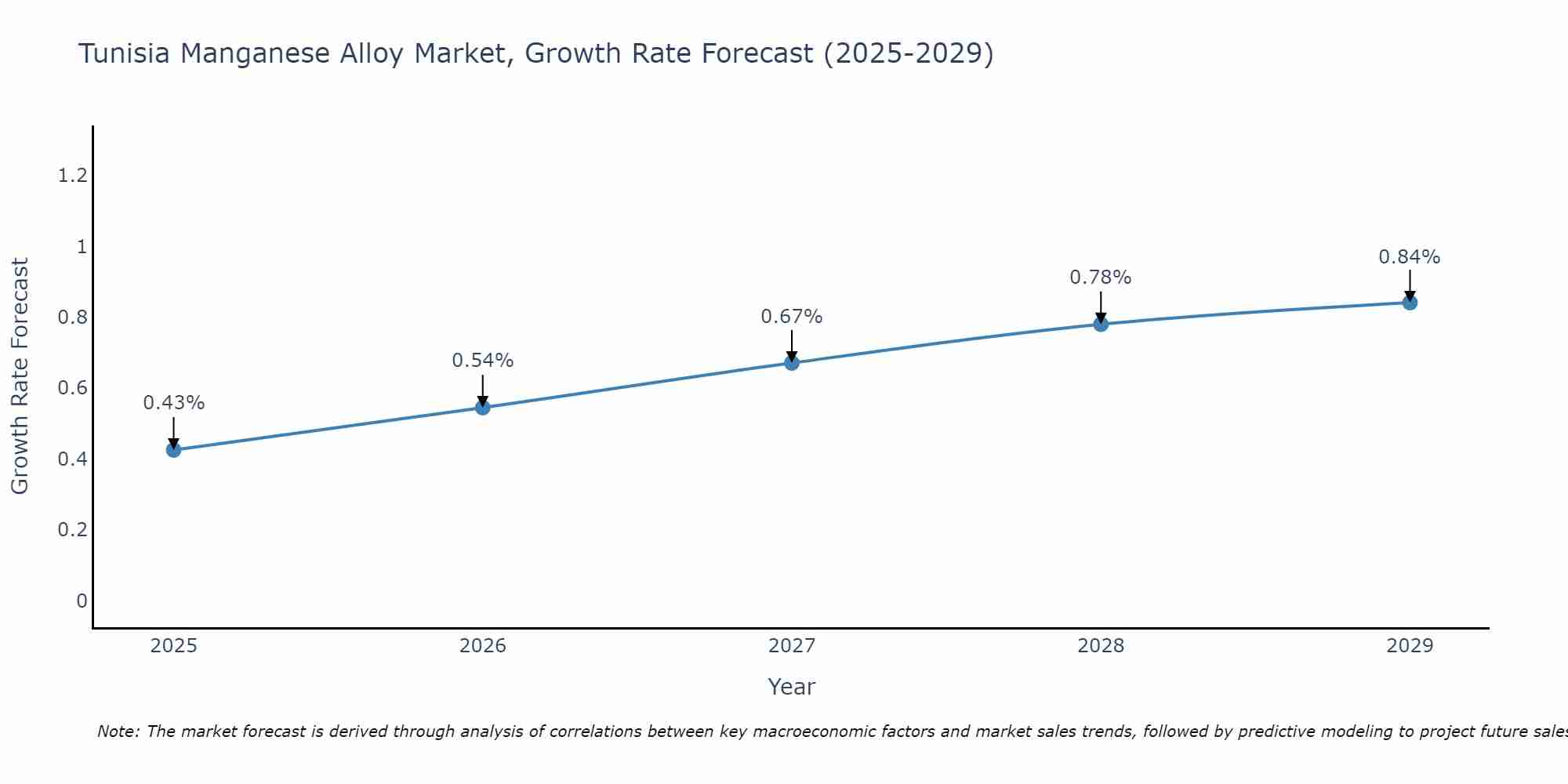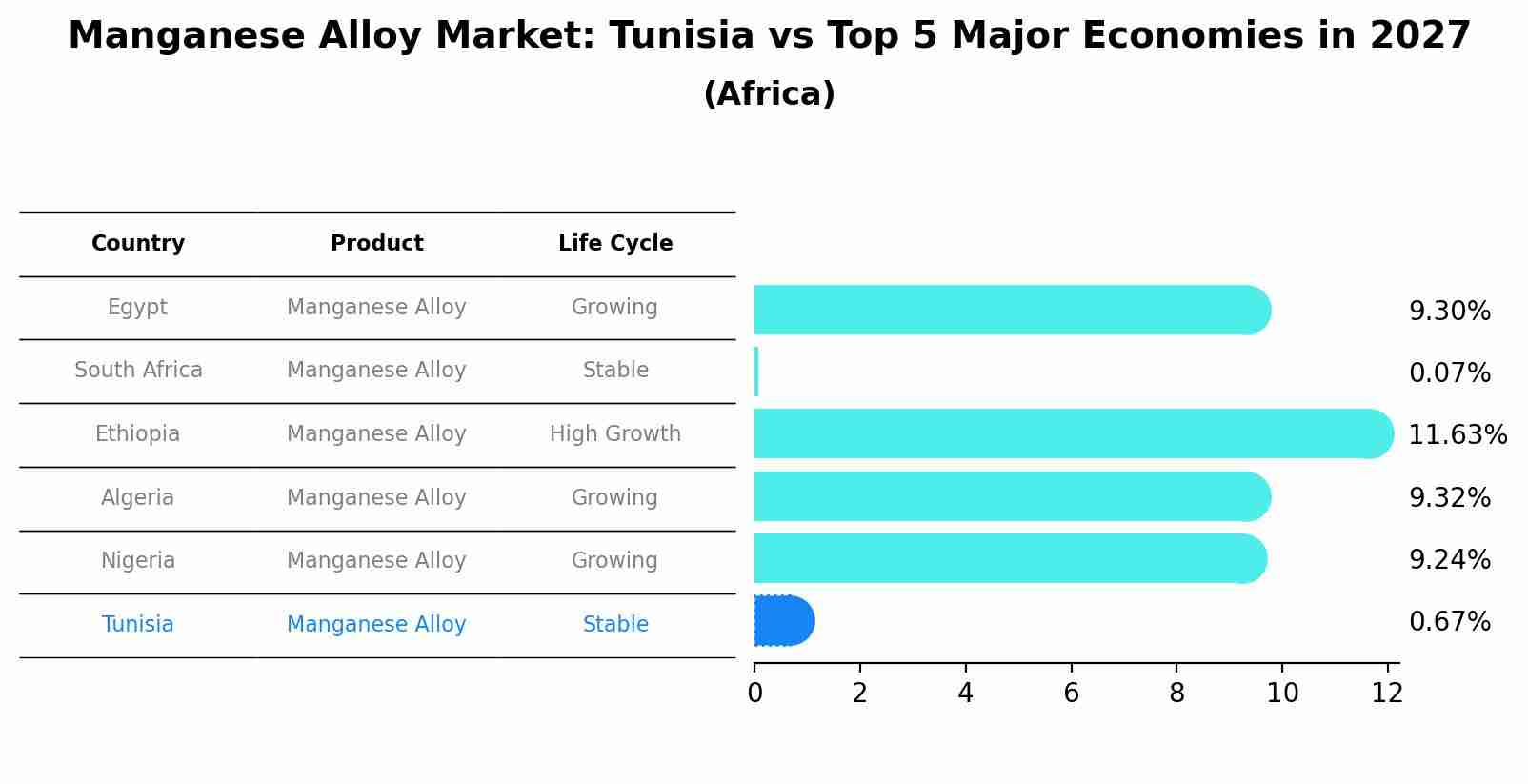Tunisia Manganese Alloy Market (2025-2031) Outlook | Trends, Forecast, Companies, Growth, Size, Analysis, Revenue, Share, Industry & Value
| Product Code: ETC091873 | Publication Date: Jun 2021 | Updated Date: Jun 2025 | Product Type: Report | |
| Publisher: 6Wresearch | Author: Shubham Deep | No. of Pages: 70 | No. of Figures: 35 | No. of Tables: 5 |
Tunisia Manganese Alloy Market Size Growth Rate
The Tunisia Manganese Alloy Market is poised for steady growth rate improvements from 2025 to 2029. The growth rate starts at 0.43% in 2025 and reaches 0.84% by 2029.

Manganese Alloy Market: Tunisia vs Top 5 Major Economies in 2027 (Africa)
The Manganese Alloy market in Tunisia is projected to grow at a stable growth rate of 0.67% by 2027, within the Africa region led by Egypt, along with other countries like South Africa, Ethiopia, Algeria and Nigeria, collectively shaping a dynamic and evolving market environment driven by innovation and increasing adoption of emerging technologies.

Tunisia Manganese Alloy Market Overview
The Tunisia Manganese Alloy market is experiencing steady growth driven by increasing demand from the steel industry. Manganese alloys are essential for steel production as they improve the strength, durability, and resistance to wear and corrosion of the final product. The market in Tunisia is primarily driven by the construction and infrastructure sectors, which are witnessing significant growth. Additionally, the automotive industry is also a key consumer of manganese alloys for manufacturing components such as engine parts and chassis. The market is characterized by a few key players operating in the region, with increasing investments in research and development to enhance product quality and meet the evolving demands of end-users. Overall, the Tunisia Manganese Alloy market is poised for further expansion in the coming years, supported by robust industrial growth and infrastructure development.
Tunisia Manganese Alloy Market Trends
The Tunisia Manganese Alloy market is experiencing growth driven by increasing demand from the steel industry. The market is seeing a rise in production capacity as manufacturers invest in expanding their facilities to meet the growing demand for manganese alloys, which are essential in steelmaking. Additionally, the market is witnessing a trend towards the development of high-grade manganese alloys with improved properties to cater to specific industrial applications. Technological advancements and innovation in production processes are also shaping the market landscape, leading to enhanced product quality and performance. Overall, the Tunisia Manganese Alloy market is poised for continued expansion as it aligns with the broader steel industry trends and strives to meet the evolving requirements of various end-user sectors.
Tunisia Manganese Alloy Market Challenges
In the Tunisia Manganese Alloy Market, some key challenges include fluctuating global demand for steel, which directly impacts the demand for manganese alloys due to their use as a key ingredient in steel production. Additionally, the market faces stiff competition from other countries producing manganese alloys, which can lead to pricing pressures and market share fluctuations. Infrastructure constraints and regulatory hurdles can also pose challenges to the market`s growth and efficiency. Moreover, the industry may also face issues related to environmental regulations and sustainability practices, as there is a growing focus on reducing the environmental impact of metal production processes. Overall, navigating these challenges while maintaining cost-efficiency and product quality is crucial for the Tunisia Manganese Alloy Market to sustain and grow its market position.
Tunisia Manganese Alloy Market Investment Opportunities
The Tunisia Manganese Alloy Market offers several investment opportunities worth considering. With a growing demand for manganese alloys in various industries such as steel production, infrastructure development, and automotive manufacturing, investing in companies involved in the production and supply of manganese alloys could be lucrative. Furthermore, Tunisia`s strategic location provides access to key markets in Europe and Africa, offering a competitive advantage for companies operating in the manganese alloy sector. As the global demand for manganese alloys continues to rise, investing in this market could yield significant returns for investors looking to capitalize on the country`s natural resources and industrial potential. However, it`s essential to conduct thorough market research and due diligence to identify the most promising investment opportunities in the Tunisia Manganese Alloy Market.
Tunisia Manganese Alloy Market Government Policy
The Tunisian government has implemented various policies to regulate the manganese alloy market in the country. These policies include restrictions on the export of manganese ore to encourage local processing and value addition, in line with the government`s efforts to promote industrialization and create job opportunities. Additionally, there are regulations in place to monitor and control the environmental impact of manganese alloy production, ensuring compliance with safety and sustainability standards. The government also provides support and incentives for local manganese alloy producers to enhance competitiveness and promote growth in the sector. Overall, these policies aim to develop a sustainable and thriving manganese alloy market in Tunisia while balancing economic growth with environmental conservation.
Tunisia Manganese Alloy Market Future Outlook
The Tunisia Manganese Alloy market is expected to experience steady growth in the coming years due to increasing demand from the steel industry. Key factors driving this growth include infrastructure development projects, urbanization, and industrialization in the region. Additionally, the growing focus on sustainable practices and the need for high-quality steel products are likely to further boost the demand for manganese alloys. However, challenges such as fluctuating raw material prices, regulatory hurdles, and competition from other markets may impact the market`s growth trajectory. Overall, with the right strategies in place to address these challenges and capitalize on emerging opportunities, the Tunisia Manganese Alloy market is poised for gradual expansion in the foreseeable future.
Key Highlights of the Report:
- Tunisia Manganese Alloy Market Outlook
- Market Size of Tunisia Manganese Alloy Market, 2021
- Forecast of Tunisia Manganese Alloy Market, 2031
- Historical Data and Forecast of Tunisia Manganese Alloy Revenues & Volume for the Period 2021 - 2031
- Tunisia Manganese Alloy Market Trend Evolution
- Tunisia Manganese Alloy Market Drivers and Challenges
- Tunisia Manganese Alloy Price Trends
- Tunisia Manganese Alloy Porter's Five Forces
- Tunisia Manganese Alloy Industry Life Cycle
- Historical Data and Forecast of Tunisia Manganese Alloy Market Revenues & Volume By Type for the Period 2021 - 2031
- Historical Data and Forecast of Tunisia Manganese Alloy Market Revenues & Volume By Ferro-Manganese for the Period 2021 - 2031
- Historical Data and Forecast of Tunisia Manganese Alloy Market Revenues & Volume By Metallic Manganese for the Period 2021 - 2031
- Historical Data and Forecast of Tunisia Manganese Alloy Market Revenues & Volume By Nickel-Manganese Alloy for the Period 2021 - 2031
- Historical Data and Forecast of Tunisia Manganese Alloy Market Revenues & Volume By Nitrided Manganese Alloy for the Period 2021 - 2031
- Historical Data and Forecast of Tunisia Manganese Alloy Market Revenues & Volume By Silico-Manganese for the Period 2021 - 2031
- Historical Data and Forecast of Tunisia Manganese Alloy Market Revenues & Volume By Iron-Manganese Alloys for the Period 2021 - 2031
- Historical Data and Forecast of Tunisia Manganese Alloy Market Revenues & Volume By Application for the Period 2021 - 2031
- Historical Data and Forecast of Tunisia Manganese Alloy Market Revenues & Volume By Foundry for the Period 2021 - 2031
- Historical Data and Forecast of Tunisia Manganese Alloy Market Revenues & Volume By Steel for the Period 2021 - 2031
- Historical Data and Forecast of Tunisia Manganese Alloy Market Revenues & Volume By Superalloys for the Period 2021 - 2031
- Historical Data and Forecast of Tunisia Manganese Alloy Market Revenues & Volume By Welding Electrodes for the Period 2021 - 2031
- Historical Data and Forecast of Tunisia Manganese Alloy Market Revenues & Volume By End-users for the Period 2021 - 2031
- Historical Data and Forecast of Tunisia Manganese Alloy Market Revenues & Volume By Medical for the Period 2021 - 2031
- Historical Data and Forecast of Tunisia Manganese Alloy Market Revenues & Volume By Mining Industry for the Period 2021 - 2031
- Historical Data and Forecast of Tunisia Manganese Alloy Market Revenues & Volume By Chemical Industry for the Period 2021 - 2031
- Historical Data and Forecast of Tunisia Manganese Alloy Market Revenues & Volume By Machinery Manufacturing Industry for the Period 2021 - 2031
- Tunisia Manganese Alloy Import Export Trade Statistics
- Market Opportunity Assessment By Type
- Market Opportunity Assessment By Application
- Market Opportunity Assessment By End-users
- Tunisia Manganese Alloy Top Companies Market Share
- Tunisia Manganese Alloy Competitive Benchmarking By Technical and Operational Parameters
- Tunisia Manganese Alloy Company Profiles
- Tunisia Manganese Alloy Key Strategic Recommendations
Frequently Asked Questions About the Market Study (FAQs):
- Single User License$ 1,995
- Department License$ 2,400
- Site License$ 3,120
- Global License$ 3,795
Search
Related Reports
- Australia IT Asset Disposal Market (2025-2031) | Strategy, Consumer Insights, Analysis, Investment Trends, Opportunities, Growth, Size, Share, Industry, Revenue, Segments, Value, Segmentation, Supply, Forecast, Restraints, Outlook, Competition, Drivers, Trends, Demand, Pricing Analysis, Competitive, Strategic Insights, Companies, Challenges
- UAE Building Thermal Insulation Market Outlook (2025-2031) | Revenue, Companies, Share, Trends, Growth, Size, Forecast, Industry, Analysis & Value
- Portugal Electronic Document Management Market (2025-2031) | Strategy, Consumer Insights, Analysis, Investment Trends, Opportunities, Growth, Size, Share, Industry, Revenue, Segments, Value, Segmentation, Supply, Forecast, Restraints, Outlook, Competition, Drivers, Trends, Demand, Pricing Analysis, Competitive, Strategic Insights, Companies, Challenges
- France Electronic Document Management Market (2025-2031) | Strategy, Consumer Insights, Analysis, Investment Trends, Opportunities, Growth, Size, Share, Industry, Revenue, Segments, Value, Segmentation, Supply, Forecast, Restraints, Outlook, Competition, Drivers, Trends, Demand, Pricing Analysis, Competitive, Strategic Insights, Companies, Challenges
- Portugal Occupational Health & Safety Services Market (2025-2031) | Strategy, Consumer Insights, Analysis, Investment Trends, Opportunities, Growth, Size, Share, Industry, Revenue, Segments, Value, Segmentation, Supply, Forecast, Restraints, Outlook, Competition, Drivers, Trends, Demand, Pricing Analysis, Competitive, Strategic Insights, Companies, Challenges
- Netherlands Occupational Health and Safety Services Market (2025-2031) | Strategy, Consumer Insights, Analysis, Investment Trends, Opportunities, Growth, Size, Share, Industry, Revenue, Segments, Value, Segmentation, Supply, Forecast, Restraints, Outlook, Competition, Drivers, Trends, Demand, Pricing Analysis, Competitive, Strategic Insights, Companies, Challenges
- Belgium and Luxembourg Facility Management Market (2025-2031) | Strategy, Consumer Insights, Analysis, Investment Trends, Opportunities, Growth, Size, Share, Industry, Revenue, Segments, Value, Segmentation, Supply, Forecast, Restraints, Outlook, Competition, Drivers, Trends, Demand, Pricing Analysis, Competitive, Strategic Insights, Companies, Challenges
- Russia Women Intimate Apparel Market (2025-2031) | Strategy, Consumer Insights, Analysis, Investment Trends, Opportunities, Growth, Size, Share, Industry, Revenue, Segments, Value, Segmentation, Supply, Forecast, Restraints, Outlook, Competition, Drivers, Trends, Demand, Pricing Analysis, Competitive, Strategic Insights, Companies, Challenges
- Africa Chocolate Market (2025-2031) | Size, Share, Trends, Growth, Revenue, Analysis, Forecast, industry & Outlook
- Global Hydroxychloroquine And Chloroquine Market (2025-2031) | Industry, Trends, Size, Outlook, Growth, Value, Companies, Revenue, Analysis, Share, Forecast
Industry Events and Analyst Meet
Our Clients
Whitepaper
- Middle East & Africa Commercial Security Market Click here to view more.
- Middle East & Africa Fire Safety Systems & Equipment Market Click here to view more.
- GCC Drone Market Click here to view more.
- Middle East Lighting Fixture Market Click here to view more.
- GCC Physical & Perimeter Security Market Click here to view more.
6WResearch In News
- Doha a strategic location for EV manufacturing hub: IPA Qatar
- Demand for luxury TVs surging in the GCC, says Samsung
- Empowering Growth: The Thriving Journey of Bangladesh’s Cable Industry
- Demand for luxury TVs surging in the GCC, says Samsung
- Video call with a traditional healer? Once unthinkable, it’s now common in South Africa
- Intelligent Buildings To Smooth GCC’s Path To Net Zero













